Paul and the Empire
Mike Ervin

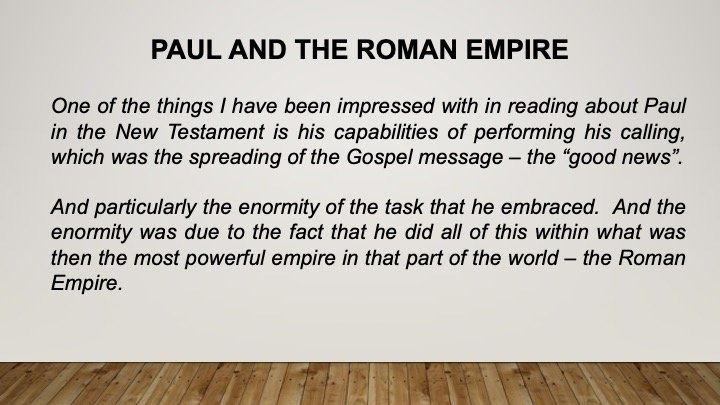
Paul and the Roman Empire
One of the things I have been impressed with in reading about Paul in the New Testament is his capabilities of performing his calling, which was the spreading of the Gospel message – the “good news”.
And particularly the enormity of the task that he embraced. And the enormity was due to the fact that he did all of this within what was then the most powerful empire in that part of the world – the Roman Empire.
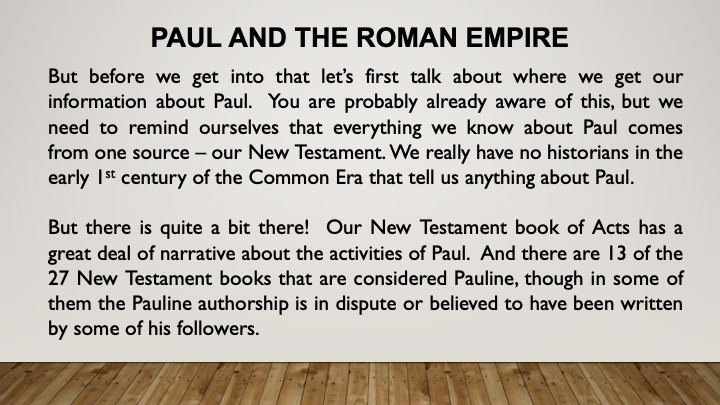
Paul
and the Roman Empire
But before we get into that let’s first talk about where we get our information about Paul. You are probably already aware of this, but we need to remind ourselves that everything we know about Paul comes from one source – our New Testament. We really have no historians in the early 1st century of the Common Era that tell us anything about Paul.
But there is quite a bit there! Our New Testament book of Acts has a great deal of narrative about the activities of Paul. And there are 13 of the 27 New Testament books that are considered Pauline, though in some of them the Pauline authorship is in dispute or believed to have been written by some of his followers.
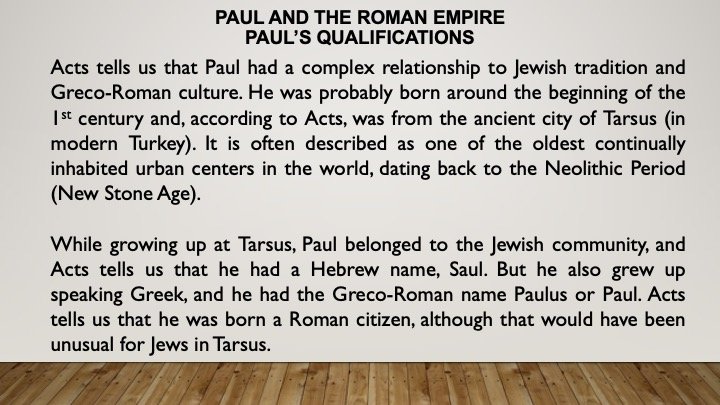
Paul and the Roman Empire
Paul’s Qualifications
Acts tells us that Paul had a complex relationship to Jewish tradition and Greco-Roman culture. He was probably born around the beginning of the 1st century and, according to Acts, was from the ancient city of Tarsus (in modern Turkey). It is often described as one of the oldest continually inhabited urban centers in the world, dating back to the Neolithic Period (New Stone Age).
While growing up at Tarsus, Paul belonged to the Jewish community, and Acts tells us that he had a Hebrew name, Saul. But he also grew up speaking Greek, and he had the Greco-Roman name Paulus or Paul. Acts tells us that he was born a Roman citizen, although that would have been unusual for Jews in Tarsus.
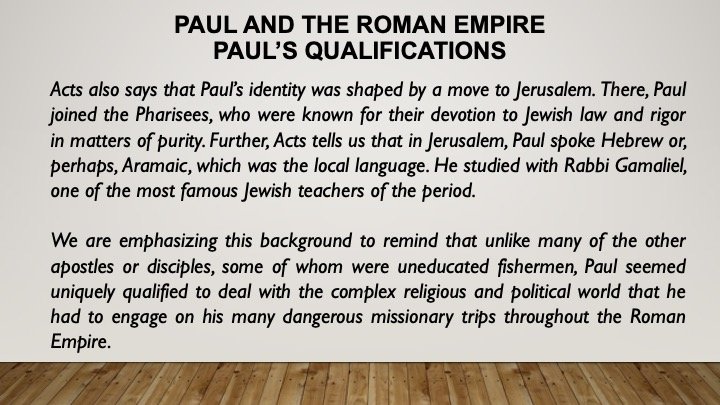
Paul and the Roman Empire
Paul’s Qualifications
Acts also says that Paul’s identity was shaped by a move to Jerusalem. There, Paul joined the Pharisees, who were known for their devotion to Jewish law and rigor in matters of purity. Further, Acts tells us that in Jerusalem, Paul spoke Hebrew or, perhaps, Aramaic, which was the local language. He studied with Rabbi Gamaliel, one of the most famous Jewish teachers of the period.
We are emphasizing this background to remind that unlike many of the other apostles or disciples, some of whom were uneducated fishermen, Paul seemed uniquely qualified to deal with the complex religious and political world that he had to engage on his many dangerous missionary trips throughout the Roman Empire.
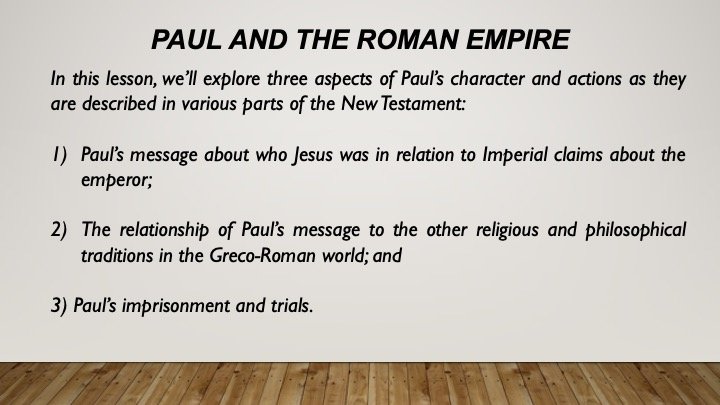
Paul and the Roman Empire
In this lesson, we’ll explore three aspects of Paul’s character and actions as they are described in various parts of the New Testament:
1) Paul’s message about who Jesus was in relation to Imperial claims about the emperor;
2) The relationship of Paul’s message to the other religious and philosophical traditions in the Greco-Roman world; and
3) Paul’s imprisonment and trials.
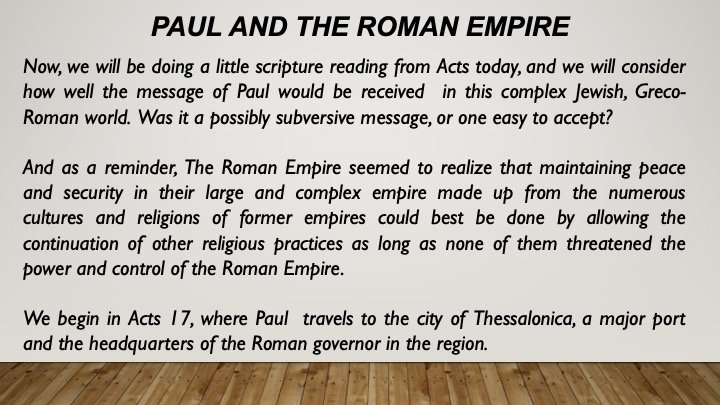
Paul and the Roman Empire
Now, we will be doing a little scripture reading from Acts today, and we will consider how well the message of Paul would be received in this complex Jewish, Greco-Roman world. Was it a possibly subversive message, or one easy to accept?
And as a reminder, The Roman Empire seemed to realize that maintaining peace and security in their large and complex empire made up from the numerous cultures and religions of former empires could best be done by allowing the continuation of other religious practices as long as none of them threatened the power and control of the Roman Empire.
We begin in Acts 17, where Paul travels to the city of Thessalonica, a major port and the headquarters of the Roman governor in the region.
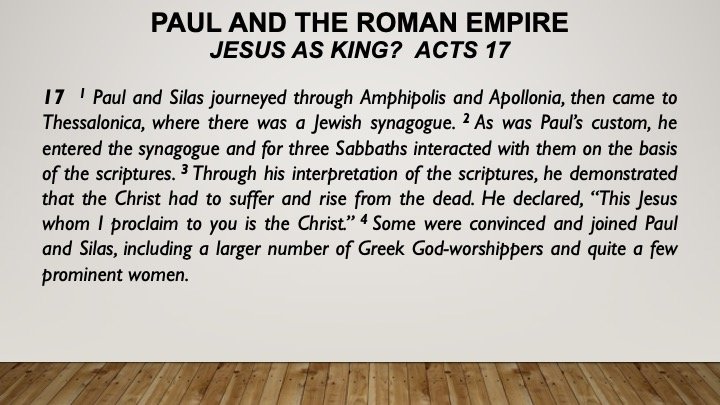
Paul
and the Roman Empire
Jesus as King? Acts 17
17 1 Paul and Silas journeyed through Amphipolis and Apollonia, then came to Thessalonica, where there was a Jewish synagogue. 2 As was Paul’s custom, he entered the synagogue and for three Sabbaths interacted with them on the basis of the scriptures. 3 Through his interpretation of the scriptures, he demonstrated that the Christ had to suffer and rise from the dead. He declared, “This Jesus whom I proclaim to you is the Christ.” 4 Some were convinced and joined Paul and Silas, including a larger number of Greek God-worshippers and quite a few prominent women.
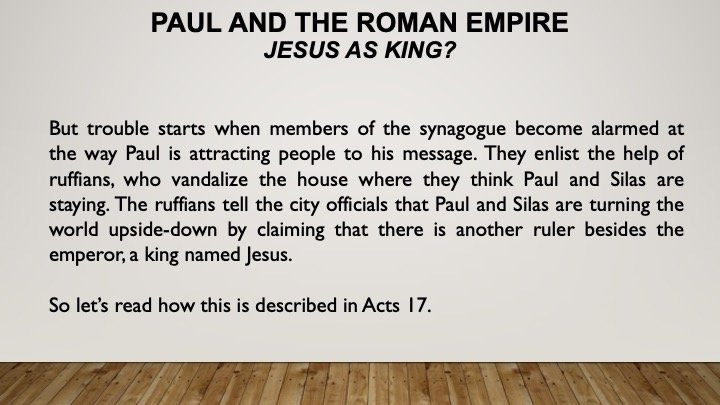
Paul and the Roman Empire
The Kingship of Jesus
But trouble starts when members of the synagogue become alarmed at the way Paul is attracting people to his message. They enlist the help of ruffians, who vandalize the house where they think Paul and Silas are staying. The ruffians tell the city officials that Paul and Silas are turning the world upside-down by claiming that there is another ruler besides the emperor, a king named Jesus.
So
let’s read how this is described in Acts 17

Paul
and the Roman Empire
Jesus as King? Acts 17
5 But the Jews became jealous and brought along some thugs who were hanging out in the marketplace. They formed a mob and started a riot in the city. They attacked Jason’s house, intending to bring Paul and Silas before the people. 6 When they didn’t find them, they dragged Jason and some believers before the city officials. They were shouting, “These people who have been disturbing the peace throughout the empire have also come here. 7 What is more, Jason has welcomed them into his home. Every one of them does what is contrary to Caesar’s decrees by naming someone else as king: Jesus.” 8 This provoked the crowd and the city officials even more. 9 After Jason and the others posted bail, they released them..
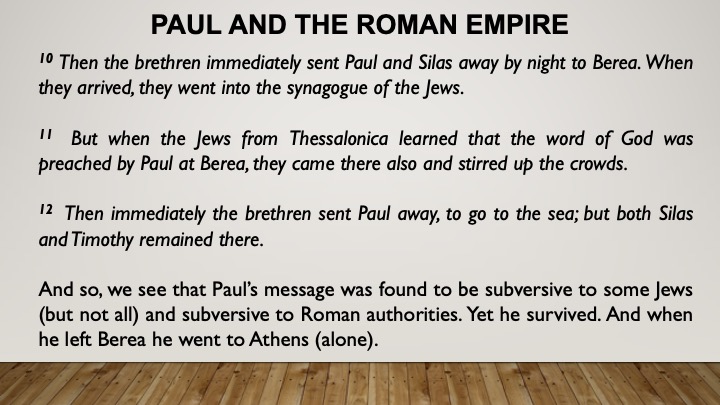
Paul and the Roman Empire
10 Then the brethren immediately sent Paul and Silas away by night to Berea. When they arrived, they went into the synagogue of the Jews.
11 But when the Jews from Thessalonica learned that the word of God was preached by Paul at Berea, they came there also and stirred up the crowds.
12 Then immediately the brethren sent Paul away, to go to the sea; but both Silas and Timothy remained there.
And so, we see that Paul’s message was found to be subversive to some Jews (but not all) and subversive to Roman authorities. Yet he survived. And when he left Berea he went to Athens (alone).
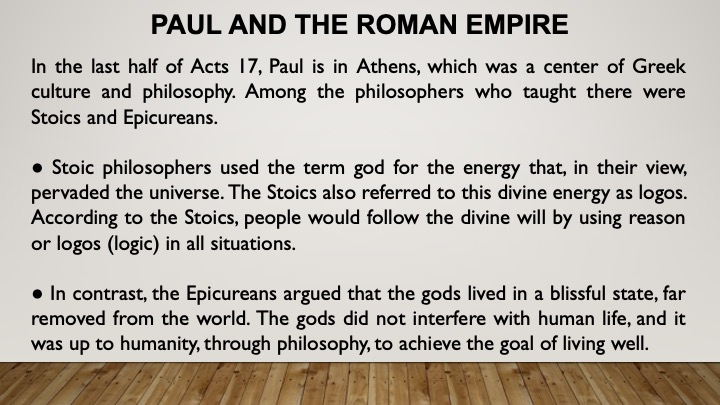
Paul and the Roman Empire
Paul Visits Athens
In the last half of Acts 17, Paul is in Athens, which was a center of Greek culture and philosophy. Among the philosophers who taught there were Stoics and Epicureans.
● Stoic philosophers used the term god for the energy that, in their view, pervaded the universe. The Stoics also referred to this divine energy as logos. According to the Stoics, people would follow the divine will by using reason or logos (logic) in all situations.
● In contrast, the Epicureans argued that the gods lived in a blissful state, far removed from the world. The gods did not interfere with human life, and it was up to humanity, through philosophy, to achieve the goal of living well.
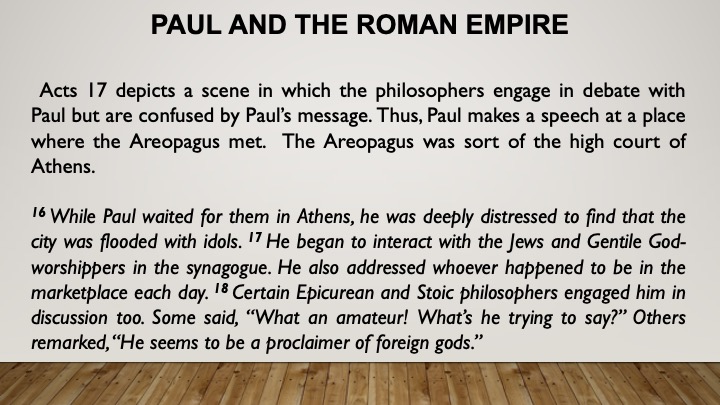
Paul and the Roman Empire
Paul Visits Athens
Acts 17 depicts a scene in which the philosophers engage in debate with Paul but are confused by Paul’s message. Thus, Paul makes a speech at a place where the Areopagus met. The Areopagus was sort of the high court of Athens.
16 While Paul waited for them in Athens, he was deeply distressed to find that the city was flooded with idols. 17 He began to interact with the Jews and Gentile God-worshippers in the synagogue. He also addressed whoever happened to be in the marketplace each day. 18 Certain Epicurean and Stoic philosophers engaged him in discussion too. Some said, “What an amateur! What’s he trying to say?” Others remarked, “He seems to be a proclaimer of foreign gods.”

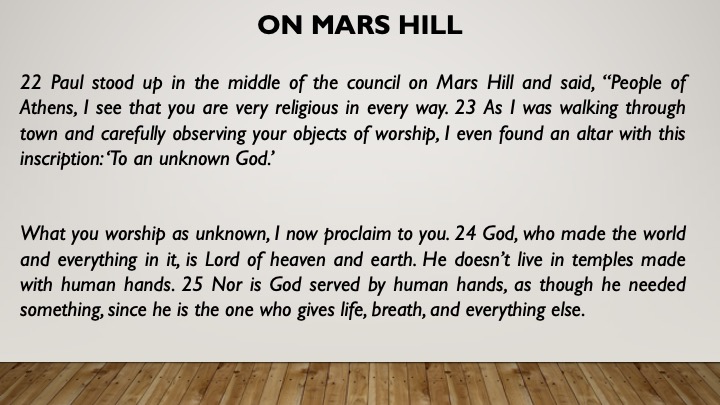
Paul and the Roman Empire
Paul Visits Athens
22 Paul stood up in the middle of the council on Mars Hill and said, “People of Athens, I see that you are very religious in every way. 23 As I was walking through town and carefully observing your objects of worship, I even found an altar with this inscription: ‘To an unknown God.’
What you worship as unknown, I now proclaim to you. 24 God, who made the world and everything in it, is Lord of heaven and earth. He doesn’t live in temples made with human hands. 25 Nor is God served by human hands, as though he needed something, since he is the one who gives life, breath, and everything else.
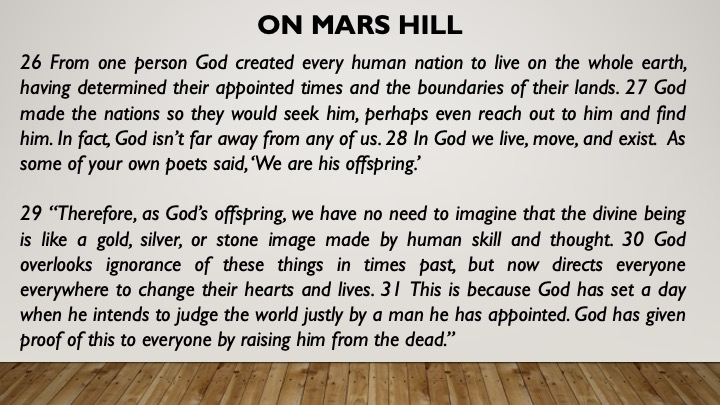
Paul and the Roman Empire
Paul Visits Athens
26 From one person God created every human nation to live on the whole earth, having determined their appointed times and the boundaries of their lands. 27 God made the nations so they would seek him, perhaps even reach out to him and find him. In fact, God isn’t far away from any of us. 28 In God we live, move, and exist. As some of your own poets said, ‘We are his offspring.’
29 “Therefore, as God’s offspring, we have no need to imagine that the divine being is like a gold, silver, or stone image made by human skill and thought. 30 God overlooks ignorance of these things in times past, but now directs everyone everywhere to change their hearts and lives. 31 This is because God has set a day when he intends to judge the world justly by a man he has appointed. God has given proof of this to everyone by raising him from the dead.”
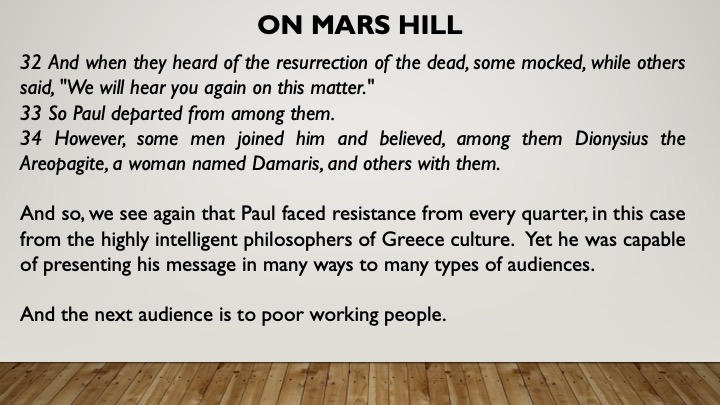
Paul and the Roman Empire
On Mars Hill
32 And when they heard of the resurrection of the dead, some mocked, while others said, "We will hear you again on this matter."
33 So Paul departed from among them.
34 However, some men joined him and believed, among them Dionysius the Areopagite, a woman named Damaris, and others with them.
And so, we see again that Paul faced resistance from every quarter, in this case from the highly intelligent philosophers of Greece culture. Yet he was capable of presenting his message in many ways to many types of audiences.
And the next audience is to poor working people.
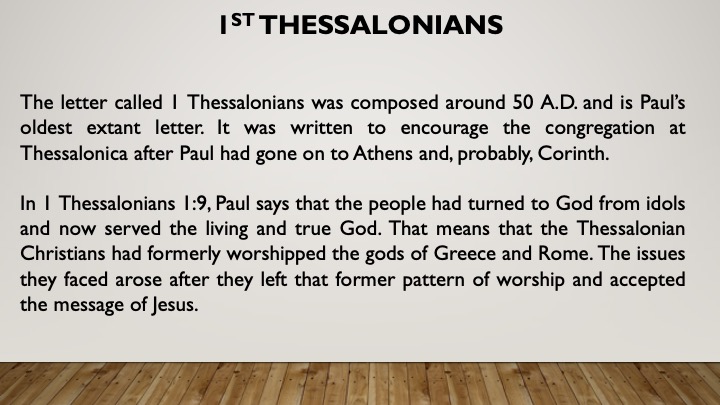
1st Thessalonians
The letter called 1 Thessalonians was composed around 50 A.D. and is Paul’s oldest extant letter. It was written to encourage the congregation at Thessalonica after Paul had gone on to Athens and, probably, Corinth.
In 1 Thessalonians 1:9, Paul says that
the people had turned to God from idols and now served the living and true God.
That means that the Thessalonian Christians had formerly worshipped the gods of
Greece and Rome. The issues they faced arose after they left that former
pattern of worship and accepted the message of Jesus.
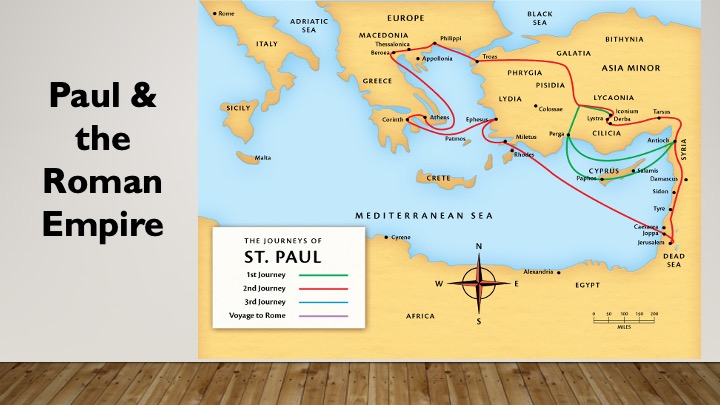
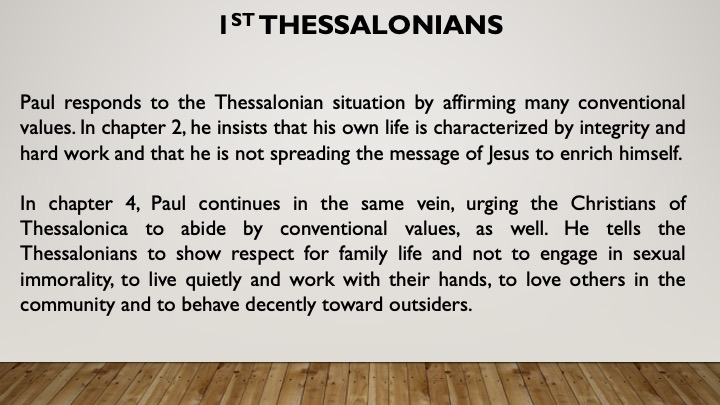
1st Thessalonians
Paul responds to the Thessalonians situation by affirming many conventional values. In chapter 2, he insists that his own life is characterized by integrity and hard work and that he is not spreading the message of Jesus to enrich himself.
In chapter 4, Paul continues in the same vein, urging the Christians of Thessalonica to abide by conventional values, as well. He tells the Thessalonians to show respect for family life and not to engage in sexual immorality, to live quietly and work with their hands, to love others in the community and to behave decently toward outsiders.
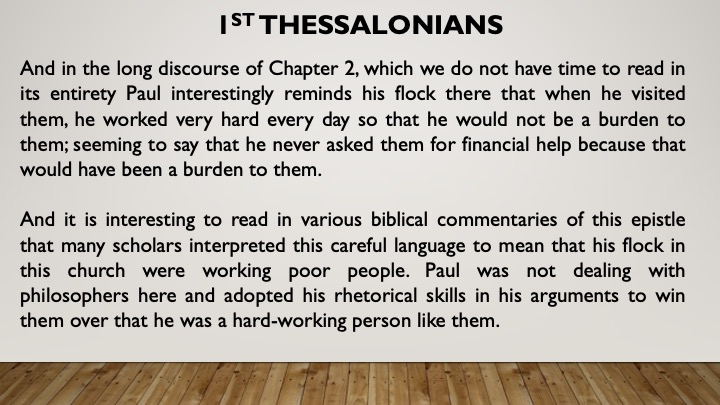
1st Thessalonians
And in the long discourse of Chapter 2, which we do not have time to read in its entirety, Paul interestingly reminds his flock there that when he visited them, he worked very hard every day so that he would not be a burden to them; seeming to say that he never asked them for financial help because that would have been a burden to them.
And it is interesting to read in various biblical commentaries of this epistle that many scholars interpreted this careful language to mean that his flock in this church were working poor people. Paul was not dealing with philosophers here and adopted his rhetorical skills in his arguments to win them over that he was a hard-working person like them.
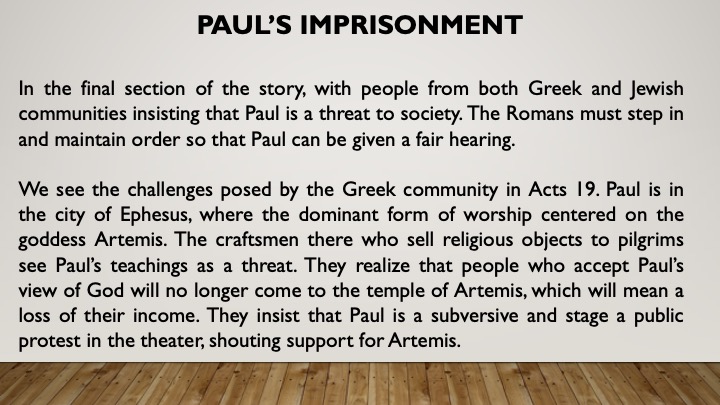
Paul’s Imprisonment
In the final section of the story, with people from both Greek and Jewish communities insisting that Paul is a threat to society. The Romans must step in and maintain order so that Paul can be given a fair hearing.
We see the challenges posed by the Greek community in Acts 19. Paul is in the city of Ephesus, where the dominant form of worship centered on the goddess Artemis. The craftsmen there who sell religious objects to pilgrims see Paul’s teachings as a threat. They realize that people who accept Paul’s view of God will no longer come to the temple of Artemis, which will mean a loss of their income. They insist that Paul is a subversive and stage a public protest in the theater, shouting support for Artemis.
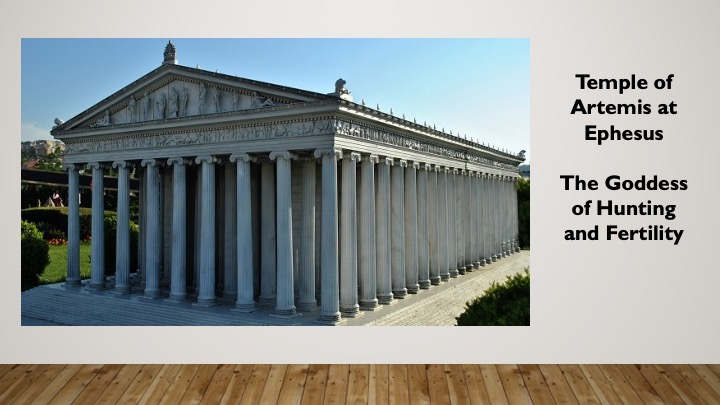
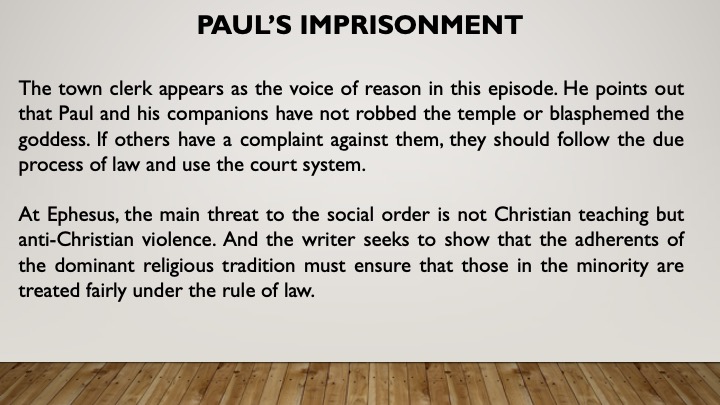
Paul’s Imprisonment
The town clerk appears as the voice of reason in this episode. He points out that Paul and his companions have not robbed the temple or blasphemed the goddess. If others have a complaint against them, they should follow the due process of law and use the court system.
At Ephesus, the main threat to the social order is not Christian teaching but anti-Christian violence. And the writer seeks to show that the adherents of the dominant religious tradition must ensure that those in the minority are treated fairly under the rule of law.
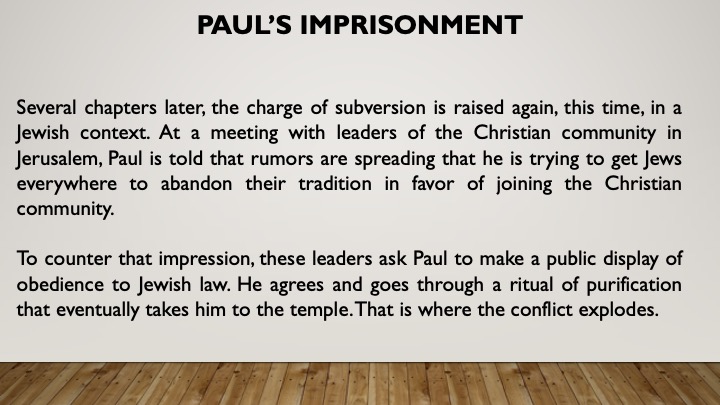
Paul’s Imprisonment
Several chapters later, the charge of subversion is raised again, this time, in a Jewish context. At a meeting with leaders of the Christian community in Jerusalem, Paul is told that rumors are spreading that he is trying to get Jews everywhere to abandon their tradition in favor of joining the Christian community.
To counter that impression, these leaders ask Paul to make a public display of obedience to Jewish law. He agrees and goes through a ritual of purification that eventually takes him to the temple. That is where the conflict explodes.
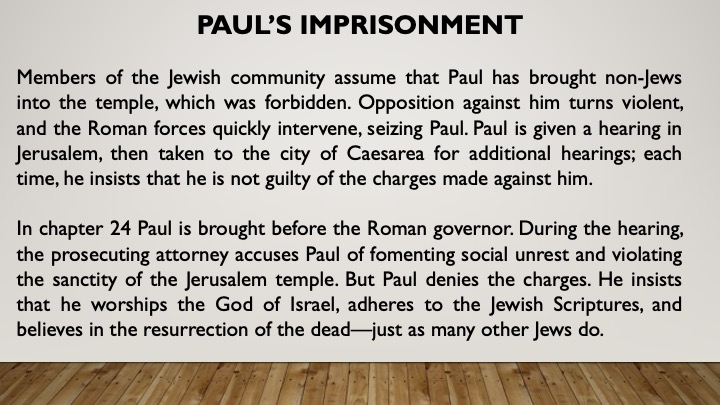
Paul’s Imprisonment
Members of the Jewish community assume that Paul has brought non-Jews into the temple, which was forbidden. Opposition against him turns violent, and the Roman forces quickly intervene, seizing Paul. Paul is given a hearing in Jerusalem, then taken to the city of Caesarea for additional hearings; each time, he insists that he is not guilty of the charges made against him.
In chapter 24 Paul is brought before the Roman governor. During the hearing, the prosecuting attorney accuses Paul of fomenting social unrest and violating the sanctity of the Jerusalem temple. But Paul denies the charges. He insists that he worships the God of Israel, adheres to the Jewish Scriptures, and believes in the resurrection of the dead—just as many other Jews do.
Paul’s Imprisonment
Paul remains in prison in Caesarea for two years. When a new governor arrives, Paul’s opponents repeat the charges against him, but Paul demands that his case be brought directly to the emperor - his right as a Roman citizen.
In chapter 27, Paul is placed on a ship with a Roman guard. After a shipwreck, he ultimately reaches Rome, where the story ends, leaving Paul under house arrest and waiting for a hearing with the emperor.
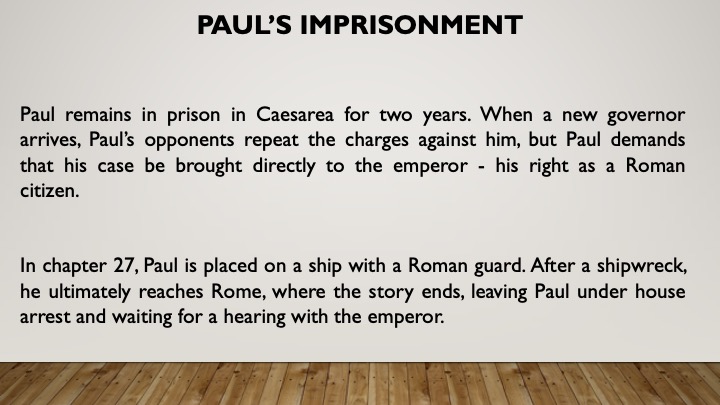
Paul’s Imprisonment
Paul remains in prison in Caesarea for two years. When a new governor arrives, Paul’s opponents repeat the charges against him, but Paul demands that his case be brought directly to the emperor - his right as a Roman citizen.
In chapter 27, Paul is placed on a ship with a Roman guard. After a shipwreck, he ultimately reaches Rome, where the story ends, leaving Paul under house arrest and waiting for a hearing with the emperor.
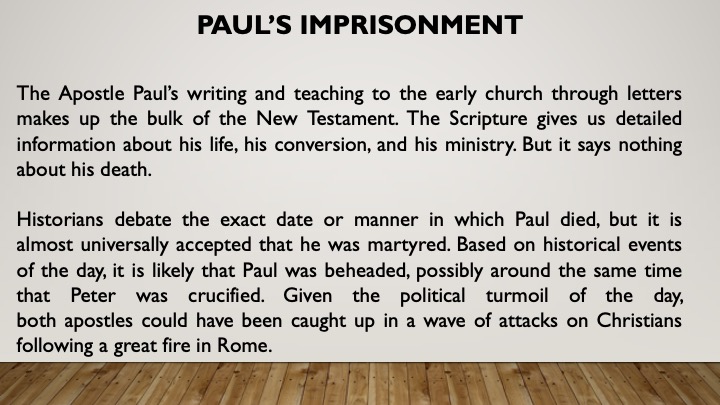
Paul’s Imprisonment
The Apostle Paul’s writing and teaching to the early church through letters makes up the bulk of the New Testament. The Scripture gives us detailed information about his life, his conversion, and his ministry. But it says nothing about his death.
Historians debate the exact date or manner in which Paul died, but it is almost universally accepted that he was martyred. Based on historical events of the day, it is likely that Paul was beheaded, possibly around the same time that Peter was crucified. Given the political turmoil of the day, both apostles could have been caught up in a wave of attacks on Christians following a great fire in Rome.
